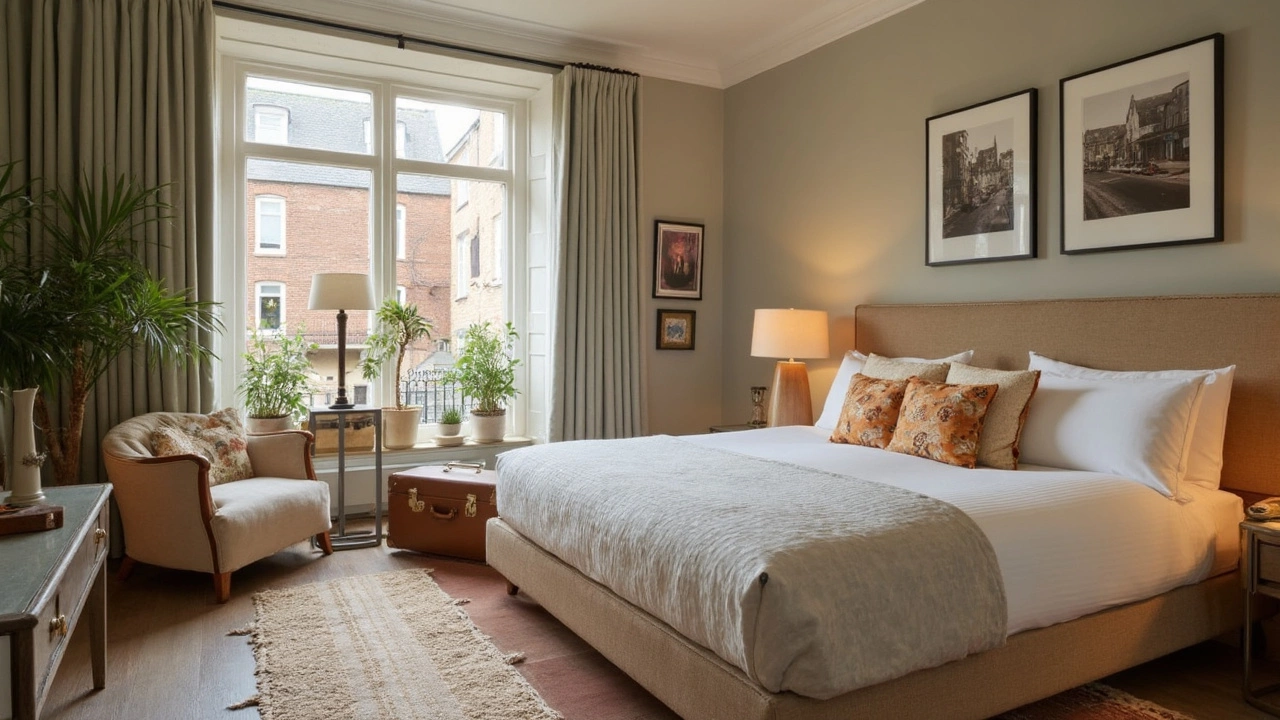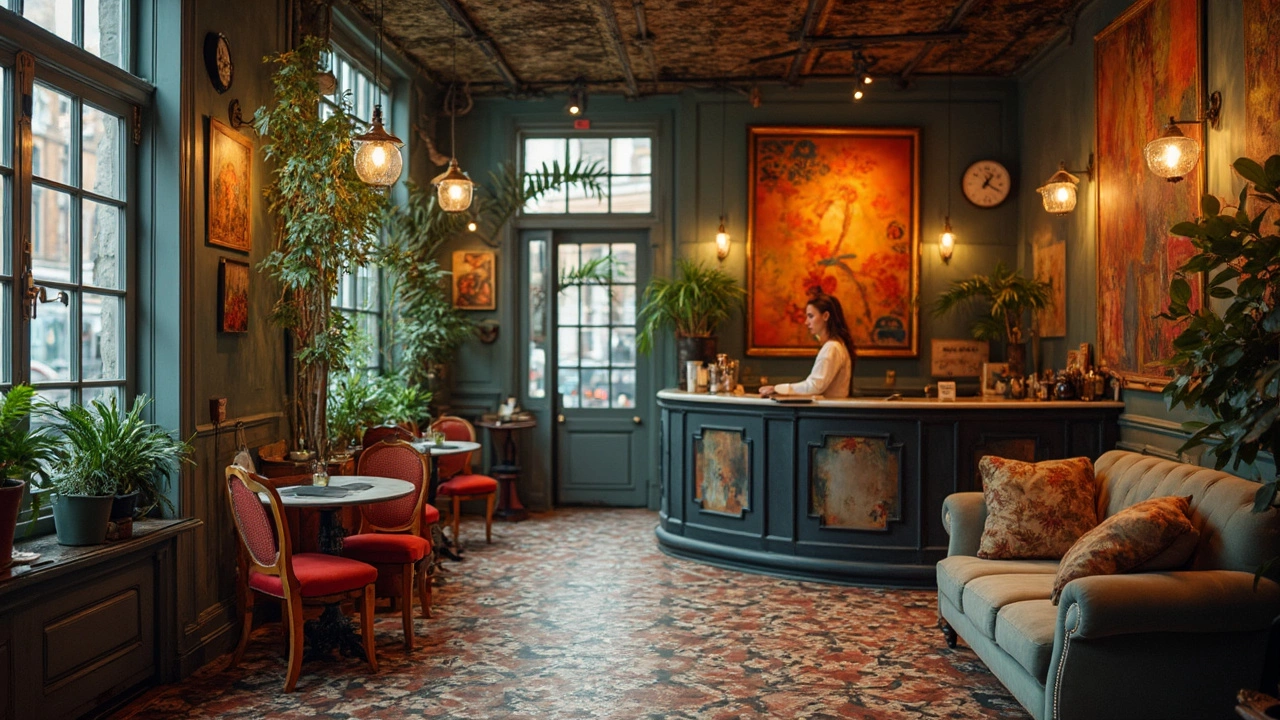The term “boutique hotel” gets tossed around a lot, but it’s not just marketing fluff. These hotels are smaller, often quirky spots that trade in cookie-cutter for character. They’re the total opposite of those mega chains where every room feels the same, no matter if you’re in Madrid or Miami.
If you want a taste of how different a boutique stay can feel, picture this—walking into The Hoxton in Paris. Think exposed brick, local art on the walls, breakfast in a paper bag at your door, and a cozy bar where locals actually hang out. This isn’t just somewhere to crash; it’s a place with personality, tucked right in the heart of the city.
- What Defines a Boutique Hotel?
- A Real Example: The Hoxton, Paris
- Design and Atmosphere
- Personalized Service
- Tips for Booking Boutique Hotels
- Are Boutique Hotels Worth It?
What Defines a Boutique Hotel?
Boutique hotel isn’t just a fancy way of saying “small hotel.” It’s got real meaning behind it. A boutique hotel usually has fewer than 100 rooms, so you get an intimate vibe. It’s more like staying in someone’s well-designed home than a giant anonymous building. These places stand out because they care about details—think cool décor, locally sourced snacks, and real plants, not the fake stuff.
What really makes these hotels different? Here are the basics:
- Unique Style: Every boutique spot looks different. You won’t find the same art or carpet anywhere else. Design is a huge priority, and it usually reflects the culture or vibe of the city.
- Personalized Service: Staff actually get to know you. Some even remember your coffee order or that you hate feather pillows.
- Local Flavor: Many boutique hotels support nearby businesses. You might see coffee from the neighborhood roaster and find a bar with local craft beers.
- Independent Ownership: Most of these hotels are either independent or belong to a small chain. They’re not run by the big hotel giants.
This approach to hospitality really works, too. Check out some quick numbers on why travelers like these hotels:
| Feature | Traveler Preference (%) |
|---|---|
| Unique Design | 67 |
| Personal Service | 59 |
| Local Connections | 48 |
| Small Size | 44 |
So, in a nutshell, boutique hotels are compact, one-of-a-kind, and big on experience. Next time you’re tired of bland hotel halls, try hunting down a boutique spot—you might end up in a place that feels more like a hangout than a hotel.
A Real Example: The Hoxton, Paris
If you ask someone who’s into boutique hotels for a solid example, The Hoxton in Paris always pops up. This place takes up residence in a classic 18th-century building in the 2nd arrondissement, right in a lively part of the city. It’s got 172 rooms, so it’s not tiny, but the vibe is cozy and welcoming—much more personal than one of those giant chains.
The Hoxton isn’t just about a bed to sleep in. Its rooms hit that sweet spot between modern and vintage, with herringbone floors, retro lighting, and super comfy beds (I’m talking real, sink-in kind of comfort). They even sort the rooms by size, with cute nicknames like Shoebox and Biggy, so you know what you’re getting. Free water, coffee, and a little breakfast bag delivered to your door? Yep, that’s how they do mornings.
But what makes it feel so different? It’s the details: curated art, local food menus, friendly staff who actually remember your name, and a buzzing bar that draws in Parisians—not just tired travelers. Plus, you’ll find co-working spaces and pop-up events, from DJ nights to craft markets. Basically, it feels like you’re part of the neighborhood.
- Location is key: close to the trendy Rue Montorgueil, famous for its food spots and bakeries.
- Pet-friendly rooms if you don’t want to leave your dog at home (trust me, Max would love it).
- Easy check-in with digital keys, so you skip the classic hotel paperwork drama.
The Hoxton proves a boutique hotel isn’t just about where you crash at night. It’s about being somewhere with real energy—like staying at a cool friend’s urban pad, right in the middle of Paris.
Design and Atmosphere
If you’ve ever walked into a boutique hotel like The Hoxton in Paris, you’ll notice right away that the vibe is just different. These places put serious thought into design choices. No two rooms are exactly the same. One guest might get vintage leather chairs and playful wallpaper, while the next has a sleek, modern vibe with local photography on the walls.
Boutique hotels don’t pile on generic décor. Instead, everything feels intentional, almost like you’re staying in someone’s cool city apartment. At The Hoxton, each floor shows off something unique—one level goes heavy on bold colors, another leans into minimalist touches and exposed beams. Even their lobby doubles as a lively neighborhood hangout; you’re as likely to see folks from down the street as you are to spot tourists.
Lighting, furniture, and layout—these places sweat the small stuff. The Hoxton’s public spaces have a mix of couches, mismatched armchairs, and plants everywhere. It’s miles away from the neutral lobby of a chain hotel, and it honestly just feels warmer and more lived-in.
Want a quick breakdown of common traits in boutique hotel design? Check this out:
- Original artwork (not prints you see everywhere)
- Furniture picked for comfort and style—sometimes vintage, sometimes local
- Bold or quirky color schemes
- Open, relaxed shared spaces instead of stiff lounges
- Adaptive layouts—no “standard” floor plan
- Each room having its own personality
Some boutique hotels even track guest reactions to certain features and redesign parts of the space every few years based on that feedback. That’s probably why people keep coming back—they notice the personal touch. According to a 2024 hospitality trends report, 63% of urban travelers prefer hotels with distinctive social spaces that feel more like a home than a business.
| Design Feature | Boutique Hotels | Chain Hotels |
|---|---|---|
| Room Variations | Unique in each room | Standardized |
| Shared Spaces | Homey, social | Formal, interchangeable |
| Artwork | Local and original | Mass-produced |
| Furniture | Hand-picked, often local or vintage | Corporate uniformity |
Long story short: if you want atmosphere, authentic style, and thoughtful design, boutique hotels are where it’s at.

Personalized Service
If you’ve ever felt like just another room number at a big hotel, you’ll notice the difference right away at a boutique hotel. Staff usually know your name, and they often remember little details about you—even if you’re only staying for a night or two. For example, at The Hoxton, Paris, front desk staff will actually chat with you about your day, not just hand you your room key like it’s a transaction.
Guests at boutique hotels often mention how the team helps with restaurant reservations, local tips, or even organizing experiences you wouldn’t find on a tourist website. Want to find the best bakery off the tourist map or need dog-friendly parks because you brought Max along? They’ve got you.
Here’s what you might get that you won’t see at the average chain hotel:
- Tailored welcome gifts (like locally roasted coffee or a handmade keychain)
- Flexible check-in and check-out, if you ask nicely
- Custom breakfast options or little surprises (room-service croissants, anyone?)
- Direct line or WhatsApp for last-minute requests
- Locally curated recommendations, not just stock printouts
Some stats back up just how much people notice this service. According to a 2024 survey by GuestRevu, 88% of boutique hotel guests said personalized interactions were “the highlight” of their stay, compared to only 53% for chain hotel guests.
| Feature | Boutique Hotels (%) | Chain Hotels (%) |
|---|---|---|
| Personalized interactions rated as highlight | 88 | 53 |
| Staff remembered guest preferences | 81 | 29 |
The point is, with boutique hotels, you actually feel like a guest—someone the staff wants to see again, not just another booking in the system.
Tips for Booking Boutique Hotels
Booking a boutique hotel isn’t like locking down a room at a chain. These places usually have fewer rooms—sometimes just 10 or 20—so they fill up fast during busy times. If you’ve got your eye on a certain hotel, locking in your dates early makes a big difference.
What makes boutique hotels so memorable? It often comes down to the personal touches and location. But not all of them offer the same services, so don’t assume you’ll get a pool, gym, or even breakfast. Check what’s included before you hit that book button. Many boutique hotels throw in small perks like free bikes, local snacks, or happy hours, but it always pays to double-check.
Here are some practical tips if you’re aiming for a great stay:
- Read recent reviews to spot patterns in guest experiences—websites like TripAdvisor and Google Reviews are your go-to.
- Reach out directly to the hotel. Sometimes you’ll get a better rate than booking through an aggregator, and you might hear about upgrades or perks.
- Ask about pet policies if you’re bringing a furry friend. Some boutique hotels roll out the red carpet for dogs, while others do not allow pets at all.
- Double-check location. Boutique usually means you’re right in the heart of town, but sometimes "central" can mean different things, so peek at the map.
- If you travel for work, ask about WiFi and workspaces—some boutiques are super hip but might overlook business amenities.
You’ll find that boutique hotels tend to focus on the little stuff. As Samantha Brown, travel expert and TV host, puts it:
"Boutique hotels win travelers over by giving them personalized service—making you feel like a guest, not a number, from the moment you walk in."
Price is all over the board. On average, boutique hotels in Europe run anywhere from $120 to $350 per night depending on the city and season. Here’s a quick look at average nightly rates by popular destinations:
| City | Average Nightly Rate (USD) |
|---|---|
| London | $240 |
| Paris | $225 |
| New York | $330 |
| Bangkok | $130 |
| Lisbon | $170 |
So, book early, ask questions, and don’t be shy about snagging perks. That’s how you land the best boutique stay out there.
Are Boutique Hotels Worth It?
People always want to know: is it actually worth paying extra for a boutique hotel? The truth is, if you’re tired of the same old hotel routine and want a trip that feels more personal, it’s often 100% worth it. You’re not just getting a room; you’re getting a vibe and service that huge hotel chains just can’t deliver.
Here’s what makes boutique hotels a solid choice:
- Unique Designs: Each hotel has its own look and story. You can actually remember the décor and the feel of the room, unlike at big-brand chains.
- They’re Usually Smaller: Fewer rooms means staff have time for you. Need late checkout? Want a local restaurant recommendation? It’s way more relaxed.
- Local Flavor: Many boutique hotels work with local businesses. You’ll get food and drinks you probably wouldn’t see on a chain’s menu, plus locations right in cool city spots instead of by the highway.
- Extras and Perks: You often get free bikes, happy hours, or in-room treats. Little stuff like that just makes the trip feel special.
Alright—so what’s the catch? Prices are usually a bit higher per night compared to big hotels. But, when you factor in the value from extra perks, location, and the personal touch, many travelers think it actually evens out.
| Feature | Boutique Hotel | Big-Chain Hotel |
|---|---|---|
| Room Size | Standard to spacious, often unique | Standard, predictable |
| Service | Very personalized | Efficient, but not personal |
| Perks | Free bikes, local snacks, welcome drinks | Loyalty points, basic amenities |
| Design | Creative, never generic | Uniform, generic |
| Price | Usually higher, with added value | Usually lower, fewer frills |
One tip—check out online reviews carefully before booking. Boutique hotels can be hit-or-miss, since each one’s different. Look for ones praised for helpful staff, cleanliness, and a great atmosphere. If those boxes are ticked, there’s a good chance you’ll feel like you got your money’s worth.

